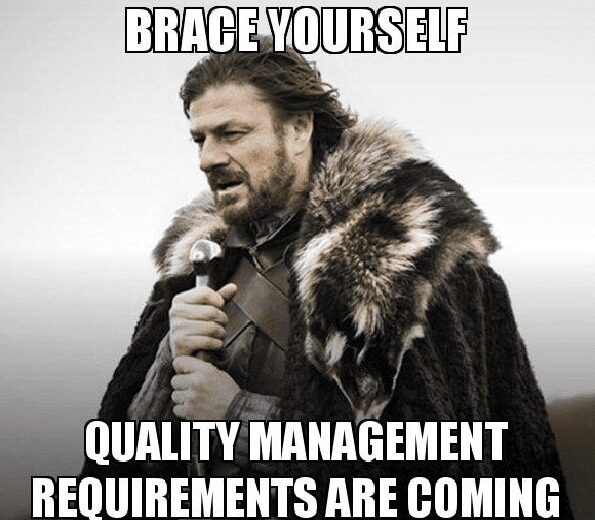The foundation of a quality association is a successful quality management system and although numerous private ventures might not have enough resources accessible to put into quality administration, yet it can still be done in an effective manner. Successful QMS‘ is thorough procedures, which can constantly build the monetary and quality value of products and services. They work to enhance the experience your clients’ experiences, which, is an essential step for a small company in order to meet client requirements.
Throughout modern business history, organizations have endeavored to open value by coordinating their structures to their methodologies. As large scale manufacturing dominated the nineteenth century, for example, organizations created tremendous economies of scale by centralizing main functions like finance, deals, and operations. A couple of decades later, as firms enhanced their contributions and moved into new districts, a rival model developed. Companies, for example, General Motors and DuPont made specialty units organized around items and geographic markets. The smaller specialty units yielded a few economies of scale however they were progressively adaptable and versatile to the local market.

Numerous multinational companies adopted a matrix course of action in a belief that they could hold both the economies of scale of centralized functionalities and the flexibility of their product line and geographic business units. But, matrix companies were hard to coordinate with. The managers working at a matrix convergence needed to juggle two tasks at a time, which prompted struggle and delay. The business process reengineering of the 1990s presented one more model, in which the enterprise composed around its different procedures rather than its conventional functional, item, and geographic limits. Yet, various process-centered businesses still had issues planning and adjusting their activities; a silo is a silo whether it is a business procedure, or grouping a product. Recently, we’ve been catching wind of “virtual” and “arranged” associations working over traditional limits and the “Velcro association,” an organization equipped for being pulled apart and reassembled in better approaches to react to changing opportunities.
What is a QMS?

A quality management system (QMS) is a formal procedure used to survey the tasks, items, and administrations of business – with the goal being to recognize zones that may require quality enhancement. Quality management systems are required in every aspect of business activity, paying little heed to the span of the organization. A decent quality management system will:
- Decrease wastage
- Enhance process control
- Increment piece of the overall industry
- Lower costs
- Encourage preparing
- Meet clients desires
- Raise Morale
- Staying aware of the challenge – regardless of whether it’s greater than you are!
Any independent venture must do all that it can to stay aware of its bigger rivals. Independent ventures must be situated towards great business results in the broadest sense to have any preferred standpoint. As a rule, when organizations consider business results, they will in general spotlight exclusively on money-related outcomes, for example, dissolvability, liquidity, incomes, and benefits. In any case, so as to accomplish increasingly feasible budgetary outcomes the business ought not to overlook the way that the nature of administrations or items they pitch to their customers are what really yields results. This is the reason a business must focus its consideration, on money-related outcomes, as well as on the nature of what they convey, to guarantee that they proceed to convey quality items and administrations to customers, holding them for a more drawn out timeframe.
Quality management systems give a structure to doing things legitimately, proficiently and successfully. They help both short and long haul systems to enable a business to run easily, whatever the span of the business.
The Main Benefits of a Quality Management System
Expanded Efficiency
Organizations who experience the ISO 9001 QMS accreditation process have the intention to expand the proficiency and nature of their procedures. As a major aspect of the procedure, rules will be set up for all representatives to pursue. This implies when managing inconvenience shooting issues, exchanges or preparing it will be a much smoother process and less depleting regarding time or budgetary expense.
Better Employee Morale

Individuals from staff should be roused and fulfilled to perform well. Clear, characterized jobs, the responsibility of the executives, set up preparing frameworks just as a reasonable comprehension of how their jobs influence the quality and the accomplishment of the business are all piece of encouraging a compelling manager/staff relationship. It bodes well to hold great staff as opposed to experience the procedure of re-procuring and re-preparing and it comes down to the way that incredible representatives are not replaceable.
Global Recognition
ISO is an overall characteristic of value management, influencing a business to seem solid and dependable. It is the objective of numerous organizations to trade globally, and ISO accreditation will go far to build up confidence in the worldwide business field.
Enhancement of Processes
You can realize what upgrades are required by the certainties that you find through an arrangement of documentation and investigation. This is a cautiously arranged and executed method, which will ensure that you settle on the right decisions for your business and dispose of the dangers of any exorbitant mix-ups.
To put it plainly, on the off chance that it goes to a choice between a bigger business with no quality management system, and a private venture with ISO confirmation, independent companies will surely probably eclipse their bigger opponents, with ISO as a moving instrument, and it will work to guarantee that once an agreement is won, it will probably be on a long haul premise, as the means important to give a hearty client encounter are as of now set up.




